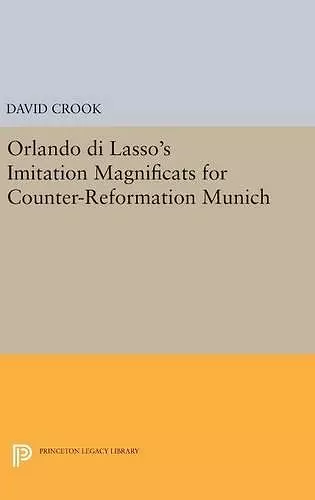Orlando di Lasso's Imitation Magnificats for Counter-Reformation Munich
Format:Hardback
Publisher:Princeton University Press
Published:19th Apr '16
Currently unavailable, and unfortunately no date known when it will be back
This hardback is available in another edition too:
- Paperback£45.00(9780691601175)

After the Mass Ordinary, the Magnificat was the liturgical text most frequently set by Renaissance composers, and Orlando di Lasso's 101 polyphonic settings form the largest and most varied repertory of Magnificats in the history of European music. In the first detailed investigation of this repertory, David Crook focuses on the forty parody or imitation Magnificats, which Lasso based on motets, madrigals, and chansons written by such composers as Josquin and Rore. By examining these Magnificats in their social, historical, and liturgical contexts and in terms of composition theory, Crook opens a new window on the breadth and subtlety of an important composer often harshly judged on his use of preexistent music. Crook places Lasso amidst the Counter-Reformation reforms at the Bavarian court where he composed the Magnificats, and where there emerged a fanatical Marian cult that favored this genre. In a section on compositional procedure, Crook explains that Lasso abandoned the traditional eight psalm-tone melodies in his imitation Magnificats, considers the new ways he found to represent the tones, and describes how Lasso's experimentation reflected the complex relationship between mode and tone in Renaissance theory and practice. Arguing that Lasso's varied uses of preexistent music defy current definitions of parody technique, Crook, in his final chapter, reveals the imitation Magnificats as vastly more imaginative and innovative than previous characterizations suggest. Originally published in 1994. The Princeton Legacy Library uses the latest print-on-demand technology to again make available previously out-of-print books from the distinguished backlist of Princeton University Press. These editions preserve the original texts of these important books while presenting them in durable paperback and hardcover editions. The goal of the Princeton Legacy Library is to vastly increase access to the rich scholarly heritage found in the thousands of books published by Princeton University Press since its founding in 1905.
"Crook's study contains a wealth of detail, and its significance reaches beyond the narrow confines that its title might suggest... The study is an important contribution to our understanding of Lasso's compositional process and to the reevaluation of Catholic church music of the immediate post-Tridentine period."--Sixteenth Century Journal
ISBN: 9780691630939
Dimensions: unknown
Weight: 595g
312 pages